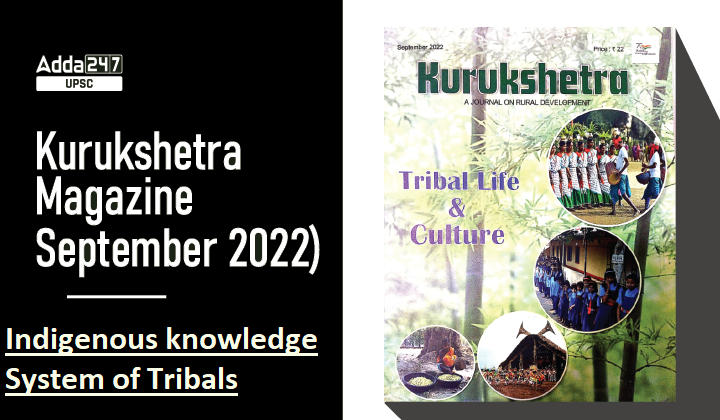Table of Contents
Indigenous knowledge System of Tribals: Introduction
- Indigenous knowledge is embedded in community practices, institution relationships and rituals and is inextricably linked to the identity of indigenous peoples, their experiences with the natural environment, and hence their territorial and cultural rights.
- Growing numbers of scientists and organisations are recognizing that it offers cheap, locally adapted solutions to development problems, or that it can be melded with scientific knowledge to boost productivity and living standards.
- Therefore, policymakers need to pursue several steps to include IKS into mainstream knowledge and innovation narrative.
Indigenous knowledge System of Tribals: What is IKS?
- The tribal knowledge systems, shared by the Adivasis have originated from centuries of observation of nature, especially the behaviour of birds and animals.
- This Knowledge has been passed from one generation to the other solely by oral tradition, depending largely on observation by the younger generation.
- The tribal knowledge system shared by the Tribes has originated from centuries of observation of nature, especially the behaviour of birds and animals.
- An example:
- If the part of the twig which the crow carries in its beak while flying to build its nest is longer on the right side, it means there will be good rainfall in the monsoon and vice-versa.
- Similarly, ‘crows vacate their nests with the monsoon rain being just a day away’
Indigenous knowledge System of Tribals: The knowledge system of tribal people faces extinction
- There are many ‘effective’ pieces of information in every aspect of life of Adivasis which may vanish in a few years, as the younger generation finds no use for it.
- The knowledge systems will be relevant until the Adivasis continue to be an agrarian society and do not part with their culture, custom and tradition.
- Indigenous communities are not adequately valued and recognised as they face challenges in terms of preservation and expansion of their traditional knowledge and innovations in every field.
Indigenous knowledge System of Tribals: What are the challenges?
- The tribes in the country have a history of 25,000 years and their knowledge is a treasure trove.
- But, a Proper institutional framework to map, profile, and accredit indigenous knowledge and innovations is lacking.
- It is so because of remote and difficult geographical areas and due to the low level of education and skill of tribal population.
- Biopiracy is the greatest challenge
- It is the practice of commercial exploitation of biochemicals or genetic materials which occur naturally without proper procedure, acknowledgement, or benefit-sharing agreement.
- Indigenous people have traditional cognition primarily consisting of biological features and genetic diversity of the natural environment from one generation to another.
Indigenous knowledge System of Tribals: United Nations Declaration on the Rights of Indigenous Peoples (UNDRIP)
- The Declaration is the most comprehensive international instrument on the rights of indigenous peoples.
- It establishes a universal framework of minimum standards for the survival, dignity and well-being of the indigenous peoples of the world and it elaborates on existing human rights standards and fundamental freedoms as they apply to the specific situation of indigenous peoples.
Indigenous knowledge System of Tribals: What is LINKS Programme?
- In 2002, UNESCO launched its Local and Indigenous Knowledge Systems (LINKS) Programme, which aims at empowering local and indigenous peoples in various aspects of environmental management by advocating recognition and mobilisation of their unique knowledge.
- The availability of digital technology has greatly expanded possibilities for preserving indigenous knowledge that is more sensitive due to the unique characteristics of indigenous knowledge and the needs of indigenous Communities.
Indigenous knowledge System of Tribals: What is Nyubu Nyvgam Yerko?
- It is the first formal indigenous language and knowledge system school in the East Kameng district, Arunachal Pradesh.
- The school helps in promoting and preserving indigenous traditions, culture and language.
Indigenous knowledge System of Tribals: NEP 2020 and IKS
- This vision of NEP 2020, includes an immensely significant aspect of inculcating Indigenous traditional knowledge (ITK)
- National Education Policy (NEP) 2020 refers to the traditional knowledge of India that is both sustainable and strives for the welfare of all.
- In order to become the Knowledge power in this century, it is imperative that we understand our heritage and teach the world the ‘Indian way’ of doing things.
Indigenous knowledge System of Tribals: What should be done?
- There must be a National Consortium of Indigenous Knowledge Resource Centre to document indigenous knowledge and innovation.
- A strong legal framework to facilitate social participation, indigenous practices, and the protection and conservation of indigenous knowledge and resources is necessary.
- Intellectual Property Right (IPR) and Access and Benefit Sharing (ABS) should be of greater focus with respect to product development involving indegenous People and their knowledge.
- Public policy initiatives shall allow indigenous knowledge components to be added into the curricula of secondary schools, universities, and extension training institutes.
- Present-day education is distancing our children from our ethos, at least one chapter on Adivasi people, their lifestyle and knowledge systems should become part of the syllabus from high school onwards.



 TSPSC Group 1 Question Paper 2024, Downl...
TSPSC Group 1 Question Paper 2024, Downl...
 TSPSC Group 1 Answer key 2024 Out, Downl...
TSPSC Group 1 Answer key 2024 Out, Downl...
 UPSC Prelims 2024 Question Paper, Downlo...
UPSC Prelims 2024 Question Paper, Downlo...
